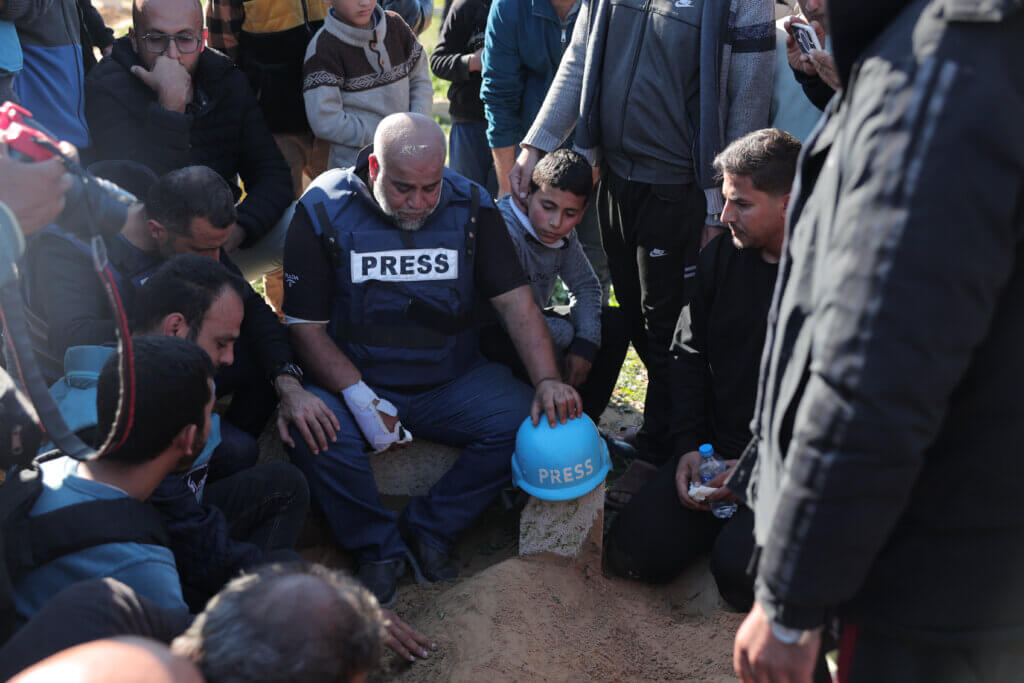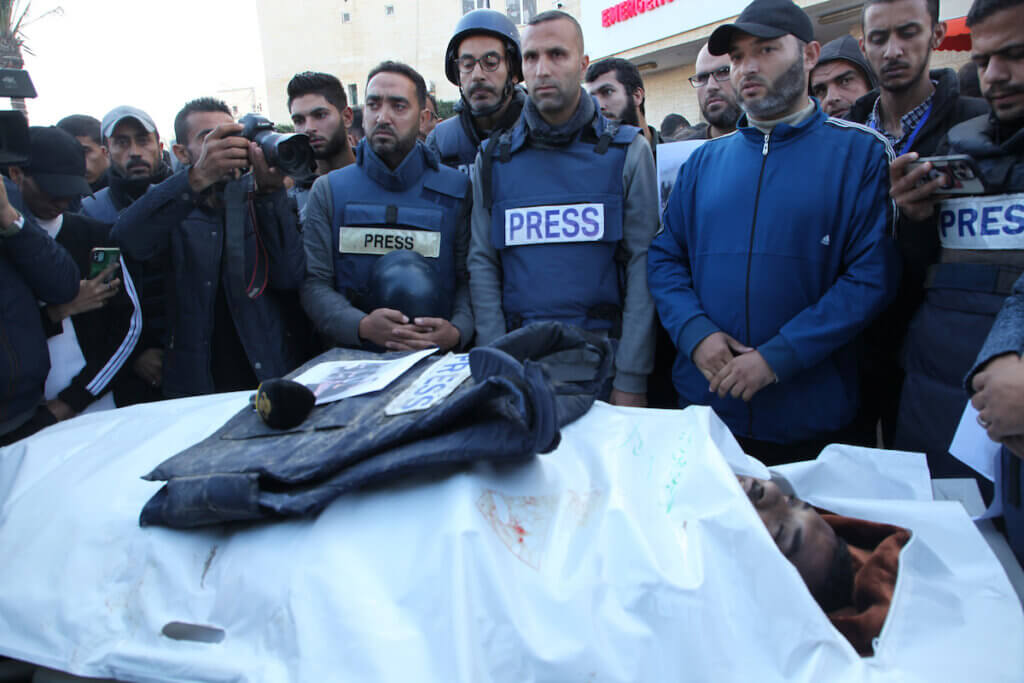Palestinian journalists have been subjected to every form of state-sponsored violence that Israel has thrown their way in order to stop the dissemination of information. Whether through means of intimidation, such as phone calls from anonymous numbers, kidnappings, and unlawful detentions in Israeli prisons, or through more violent and calculated efforts, such as airstrikes targeting journalists or their entire families, Israel has made it clear that Palestinian journalists — who pride themselves on sharing the truth to the rest of the world — are as much a threat to Israel as Hamas.
Every journalist operating in Palestine consequently faces a difficult choice. As each new day of Israel’s latest conquest of Palestinian land bleeds into the next, journalists must decide whether to continue sharing the truth with a world that does not seem to be listening or to try and save themselves.
But what does safety really mean in the middle of a genocide, where every individual is at risk of death?
‘Killed twice’
Palestinian journalists are left to stand alone as the world watches on. As Al Jazeera’s Gaza Bureau Chief Wael al-Dahdouh stated in a recent interview with MSNBC, “we feel that we are being killed twice: once by the bombs, and once by this silence, this shying away from expressing support.”
In spite of the failure of the global response to the humanitarian crisis in occupied Palestine, as well as the diplomatic efforts aimed at the establishment of a permanent ceasefire, some journalists like Dahdouh have chosen to keep reporting in the face of Israel’s cyclical phases of brutality. For many others, however, the decision has not been so easy, and the psychological, spiritual, and physical toll of the atrocities has been too much to bear.
The ramifications are evident, because for many journalists in Gaza, the costs of sharing the truth to the rest of the world have begun to outweigh the benefits, and journalists have increasingly chosen to put an end to their reporting.
On January 7, Palestinian journalist Anas El-Najar announced the end of his press coverage through a strong statement that condemned the three months of global silence and inaction in response to the genocide.
Najar’s difficult announcement was followed by waves of public support and understanding on social media. Three days later, on January 10, another Palestinian journalist, this time Ismail Jood, announced the end of his own press coverage as well.
Jood’s full statement was released in English:
Dear friends, I am announcing the end of my coverage of this ongoing aggression. We documented more than enough crimes, massacres, and the genocide that we have been facing for the last 96 days. Sadly, there was not a strong action to end this aggression that devoured citizens, journalists, medical workers, activists, and even stone and tree. We were sentenced to execution, and each one of us were waiting their turn. 96 days of loss and grief for losing our friends, homes, loved ones, and wealth. The Israeli occupation took everything away from us, we are left with some clothes that hardly keep us warm, living in tents that are not fit for animals.
And for the people who didn’t know who Ismail was and got to meet me through this genocide, I want you to know that I am a father of two beautiful children. I am the oldest son of my parents, who waited 25 years to have me due to procreation difficulties. I have a sister and a brother who count on me ever since my father became old and sick.
I survived death multiple times, and put myself in danger to show you the situation on the ground, and I believe that’s enough for now. As one of my colleagues said, “seeking safety within family is a better option than seeking coverage for a world that doesn’t know the meaning of humanity and compassion.”
With love,
Ismail Jood
His harrowing words were proven true given that, on the same day, Hamza al-Dahdouh, the eldest son of Wael al-Dahdouh, had been murdered by Israel in a targeted airstrike on his moving vehicle, alongside his fellow colleague and journalist Mustafa Thuraya, who had been traveling with him.
This reality has pushed Palestinian journalists to stop wearing their safety vests, which distinctly and markedly identify them as members of the press.
Given the Israeli army’s open admission on January 10 of deliberately assassinating both Dahdouh and Thuraya due to their alleged and unsubstantiated association with the Palestinian Islamic Jihad, it’s no wonder that many of their fellow colleagues and friends have begun to lose sight of the purpose for which they were recording Israel’s atrocities.

Despite these announcements, the majority of Palestinian journalists who have thus far chosen to stop reporting have not yet left the Gaza Strip.
Like the rest of Gaza’s residents, they are still living and surviving in unimaginable conditions under constant threat of bombardment, and are not necessarily any safer than when they were on duty. Yet, as El-Najar articulated, they regard it a better fate to die with their loved ones than to die documenting Israel’s crimes to a world that does not care.
Some journalists, such as Wael al-Dahdouh and Noor Harazeen, recently left Gaza when they found they had no other choice — with Dahdouh leaving for Qatar on January 16 for a necessary surgery on his hand that had been injured since December, and Harazeen evacuating her family out of Gaza on January 18. Just yesterday, Palestinian journalist Motaz Azaiza, whose Instagram account went viral during the war for documenting raw footage of the carnage wrought by Israel, announced that he had evacuated Gaza and was boarding a plane from Egypt to Qatar.
Both Dahdouh and Harazeen have publicly expressed their intentions of returning to Gaza to continue their coverage. Harazeen made good on that promise upon securing the evacuation of her family, returning to Gaza almost immediately after. Dahdouh remains in recovery following the success of his surgery in Qatar, but he is also expected to return at some point.
‘To kill the truth’
The UN Relief and Works Agency for Palestine Refugees (UNRWA) recently stated that the humanitarian crisis in Gaza is “staining our shared humanity” on a global scale.
The two most targeted professions by the genocide in Gaza are journalists and medical personnel. The vast majority have insisted on remaining within their beleaguered homeland, knowing that the likelihood of death for people in their profession is greater than survival.
While the common phrase, “to kill a journalist is to kill the truth” continues to circulate on social media, the fact of the matter is that as of mid-January, Israel has now murdered at least 118 journalists in Gaza, and counting.
It equally cannot be ignored that, since October 7, the Palestinian press has successfully begun to shatter the camera obscura that the Israeli regime has for so long been able to maintain.
The obstruction of Palestinian journalism remains entrenched within the Zionist political agenda for this very reason.
BEFORE YOU GO – At Mondoweiss, we understand the power of telling Palestinian stories. For 17 years, we have pushed back when the mainstream media published lies or echoed politicians’ hateful rhetoric. Now, Palestinian voices are more important than ever.
Our traffic has increased ten times since October 7, and we need your help to cover our increased expenses.
Support our journalists with a donation today.

 RELATIVES, COLLEAGUES AND LOVED ONES OF AL-QUDS TV JOURNALIST JABER ABU HADRUS’, WHO DIED IN ISRAELI ATTACKS ON NUSEIRAT REFUGEE CAMP, ATTEND HIS FUNERAL CEREMONY IN DEIR AL-BALAH, DECEMBER 30, 2023. (PHOTO: OMAR ASHTAWY/APA IMAGES)
RELATIVES, COLLEAGUES AND LOVED ONES OF AL-QUDS TV JOURNALIST JABER ABU HADRUS’, WHO DIED IN ISRAELI ATTACKS ON NUSEIRAT REFUGEE CAMP, ATTEND HIS FUNERAL CEREMONY IN DEIR AL-BALAH, DECEMBER 30, 2023. (PHOTO: OMAR ASHTAWY/APA IMAGES)














